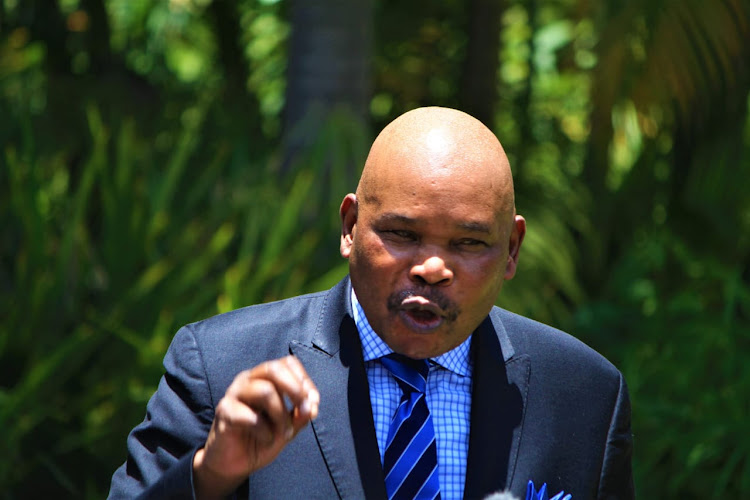 Professor Makau Mutua./FILE
Professor Makau Mutua./FILE
The freedom of the press is central to democracy. That’s why Kenya’s 2010 Constitution clads it in iron.
But the same constitution, in its letter and spirit, eschews language and conduct whose purpose is to dehumanise and tear down individuals and the body politic.
Rights are not wholesome unless they are hemmed by responsibility. Press freedom is no different.
In 1994, we saw how Radio Television Libre des Mille Collines played a critical role in fanning the Rwandan genocide.
This week’s headline in the Standard, “Tower of Babel”, is not responsible journalism. To the contrary, it’s a sensationalised, reckless misrepresentation of an annual constitutionally mandated process that requires members of the National Security Council to publicly give a report card on national security.
In my view, the Standard’s deliberate distortion of facts does a disservice to the public and undermines the very principles of responsible journalism by attempting to turn a routine exercise in democratic oversight into a fabricated spectacle of dysfunction.
The article, written by an anonymous “special correspondent,” advances a false narrative of discord among Kenya’s top security leadership, including President William Ruto, Interior Cabinet Secretary Kipchumba Murkomen, Vice Chief of the Defence Forces Lt. Gen. Omenda, and National Intelligence Director General Noordin Haji. It is a lazy and malignant hit job.
Without offering any proof or fact, the screed of an article alleges that the parliamentary testimonies by the Vice Chief of Defence Forces and the Director General of NIS reflect confusion and dysfunction at the highest levels.
This insidious framing is simplistic and misleading that at best betrays a lack of understanding of how national security governance works and is at worst a wilful attempt to inflame and demoralise the public.
The officials singled out for the malicious attacks testified before the Defence, Intelligence and Foreign Relations Committee as required by the Constitution.
They did so in the context of the ongoing national budget process.
The purpose of those hearings is to allow each agency to independently justify its budget requests based on its unique constitutional mission and mandate.
The misguided idea that there must be a singular, perfectly synchronised script across agencies is legally unfounded and is a fundamental error of ignorance or propaganda to misconstrue the essence of democratic accountability in our republic as required by the normative predicates of the Constitution.
Kenya’s security architecture is built on the principle of complementary independence.
The concept of operational autonomy combined with administrative interdependence serves as the foundation for the effective functioning of our security sector.
Each security agency, from the KDF to the NIS and the National Police Service, has a distinct Constitutional and operational mandate.
Their perspectives, priorities, processes and threat assessments may differ in an honest dialogic process. This is how the actual world works, not in some fake, unrealistic consensus to hoodwink the public.
The Director General of the NIS focuses on internal and external threats as the country’s intelligence lead, the Chief of Defence Forces emphasises border and territorial defence, and the Inspector General of the Police speaks to law enforcement and internal order.
Divergences in emphasis are not dysfunctional. Rather, they reflect Institutional diversity and a system working as designed. Expecting uniformity and rote regurgitation among them is naïve and constitutionally ignorant.
What the Standard piece did is not journalism but undigested blather devoid of knowledge and truth. It a poor excuse for a spin on institutional independence into a false narrative of chaos and disunity.
It’s nothing but cheap and provocative headline clickbait for a failing media house.
As we must defend press freedom and give it the benefit of the doubt, we cannot turn a blind eye to political attacks that have no relationship to good reportage.
Call it out, we must, because it does a great disservice to the public by undermining the collective trust of citizens in national institutions through the distortion of a critical democratic process.
The NSC operates within well-defined boundaries, and its members have distinct yet complementary roles.
When Security agencies testify before parliament, the people’s representatives, it demonstrates transparency and not chaos.
It seems to me that of late, the Standard has adopted a deliberate editorial policy of sensational, screaming headlines on matters of hifalutin national importance such as security. It’s not the work of good journalism to whip up the public.
As they say, just give us the facts, ma’am. We can conclude on our own unless you think so little of the public. Such an editorial policy can only pulverise the credibility of an already sagging traditional media. Give us rigorous, thoughtful reporting, and let us debate mano-a-mano.
Credibility is the lifeblood of any media organisation. It’s difficult to get it back once it’s lost. That would be a huge loss to our incipient democracy.
There ought to be a difference between responsible media and the gutter press, or some of the seedy recesses of social media.
Kenya is an anchor state in the region, and its citizens deserve a media that rises to match that stature, one that not only serves as a mirror of society and a true fourth estate but as a world-class industry of record.
As Kenya’s security sector opens up to public scrutiny, the citizens deserve a deliberative media, not a press that’s used by barons to fight imaginary battles.
It’s a pity that a legacy media house can sink so low as to turn national security, parliamentary oversight, and constitutional governance into mean-spirited and petty political games.
It is imperative that media houses exercise greater responsibility and fidelity to fact when reporting on matters as sensitive as national security. Democracy demands no less.
Makau Mutua is a SUNY Distinguished Professor and Margaret W. Wong Professor at Buffalo Law School, The State University of New York. He’s Senior Advisor on Constitutional Affairs to President William Ruto. @makaumutua.












